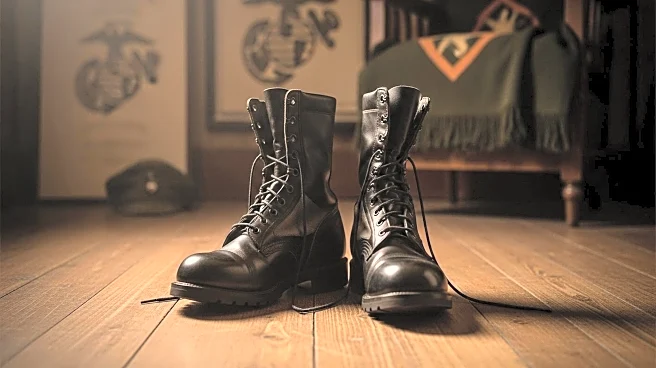What's Happening?
The Netflix series 'Boots,' premiering Thursday, delves into the experiences of gay Marines during the 1990s. Based on Greg Cope White's memoir 'The Pink Marine,' the show follows Cameron Cope, portrayed by Miles Heizer, a gay teenager who joins the Marines alongside his friend Ray. The series highlights the struggles and growth of Cameron as he navigates basic training, dealing with internal conflicts and external pressures. The narrative explores themes of identity, camaraderie, and the harsh realities of military life, including the intense training and the cultural attitudes towards gay individuals in the military during that era.
Why It's Important?
The series 'Boots' sheds light on the historical challenges faced by LGBTQ+ individuals in the military, particularly before the implementation of policies like 'Don't Ask, Don't Tell.' By portraying the personal journey of a gay Marine, the show contributes to the broader conversation about inclusivity and acceptance within the armed forces. It also serves as a reminder of the progress made in military policies regarding LGBTQ+ service members, while highlighting the ongoing need for awareness and advocacy in the face of potential setbacks in civil rights.
What's Next?
As 'Boots' reaches audiences, it may spark discussions about the representation of LGBTQ+ individuals in media and the military. The series could influence public perception and encourage further exploration of the historical and current experiences of LGBTQ+ service members. Additionally, it may prompt viewers to reflect on the importance of diversity and acceptance in all sectors of society, including the military.
Beyond the Headlines
The series not only addresses the personal struggles of its main character but also touches on broader social themes, such as the toxic environment for gay individuals in the military during the 1990s. It highlights the cultural and institutional challenges faced by LGBTQ+ service members, offering a nuanced perspective on the intersection of identity and military service. This portrayal may contribute to ongoing discussions about the need for continued progress in civil rights and equality.










